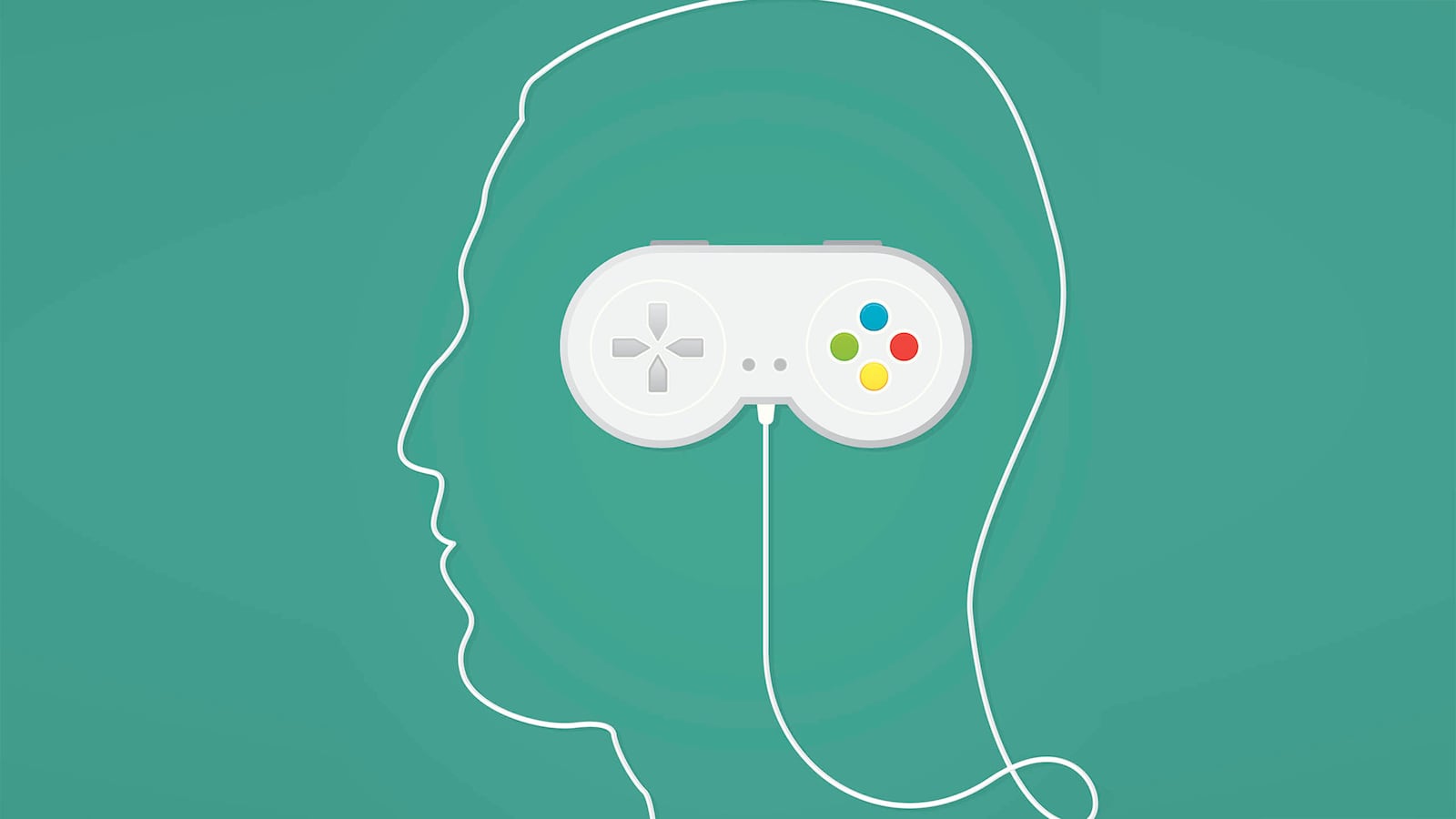When the Atari 2600 came out in the mid-1980s, scholars were worried. Were the pixelated jumping spots on the screen going to create a generation of isolated kids unable to feel or pull themselves away from the television?
Decades later, we're grappling with that question more than ever. The World Health Organization has quietly announced that gaming disorder is to be considered an addiction in the eleventh version of the organization's International Classification of Diseases, or ICD-11, defining it as "characterized by a pattern of persistent or recurrent gaming behavior.”
That’s a huge step forward for a question that has divided the mental health and psychology community for years: Does gaming a lot mean you’re addicted?
To Chris Ferguson, a psychology professor at Stetson University who has studied the psychological impact of video games, the notion of a gaming addiction is problematic at best.
He cites research published in the American Journal of Psychiatry last March that suggests that less than one percent of gamers show signs of gaming disorder. "It's a really tiny percentage of individuals who would actually qualify for this diagnosis," Ferguson told The Daily Beast. "And even at one percent, the gamers weren't worse off than the other 99 percent psychologically or physically."
When asked what made that one percent of gamers qualified to be called gaming addicts, Ferguson burst out laughing. "Uh, they play more video games. That's it."
Ferguson is not the only one wary of calling excessive gaming an addiction—a group of scholars have also publicly condemned the WHO for its new entry.
But the WHO's decision to recognize gaming disorder as an addiction is not trendsetting. It follows the footsteps of the American Psychiatric Association's Diagnostic and Statistical Manual of Mental Disorders—the official compedium of what gets recognized as a mental illness in the United States for treatment—which recognized gaming disorder in May of last year: "The 'gamers' play compulsively, to the exclusion of other interests, and their persistent and recurrent online activity results in clinically significant impairment or distress. People with this condition endanger their academic or job functioning because of the amount of time they spend playing. They experience symptoms of withdrawal when kept from gaming."
The main concern Ferguson and his colleagues have are the fact that the disorder is so poorly defined. One part Ferguson has trouble with is the sentiment during diagnosis of "I sometimes use x to make myself feel better after a stressful day."
"If x is heroin, that's bad," he explained. "If you use heroin to feel better after a stressful day, you've got issues. But if you use gardening or horseback riding or ... another hobby to feel better after a stressful day, that's normal." To Ferguson, video games can be seen as a hobby just like any other, and to use gaming as a way to relax and kick back is, in fact, healthy.
That, of course, brings up the question of whether gaming is anything like any other hobby a person might pursue. And these enjoyable activities can lead to a sense of wanting to continue doing them—a sense of addiction. But the terminology is wrong as applied to here, Ferguson said. "You're more right to say that your caffeine addiction is similar to a heroin addiction than you are to say that your video game addiction is similar to a heroin addiction," he said.
Ferguson said the idea of an activity going from enjoyable to addiction lies on a spectrum of sorts. Dopamine is often cited as the neurotransmitter released when you're experiencing any pleasurable activity—food, sex, video games, and for some, drugs—but the dopamine story is an oversold one. Ferguson said the way to really figure out if something has a true addictive quality or not is withdrawal. "I know some people try to creatively imagine what withdrawal from shopping might look like but you don't get this sort of biochemical process"—physical deprivation that causes the body to start to react with headaches, fatigue, irritability, and in extreme cases, organs shutting down. "That withdrawal can be horrific, as in the case of alcohol or benzodiazepines, or it can be mild, as in the case of caffeine."
Games though? They probably won't land you in the hospital, even in the most extreme cases.
There's also the amount of dopamine that's released that Ferguson says makes gaming's classification as an addiction questionable. Ferguson cited research that says gaming pushes dopamine up by about 150 to 200 percent over the baseline. Methamphetamines? They spike dopamine up by 1200 percent.
"'Video games are like methamphetamine,'" Ferguson chuckled in disbelief. "They have a tiny involvement with dopamine, that's true, but the amount is important.
"It's very misleading," Ferguson continued about how gaming has been connected to mass violence and mental illness, which his research shows to not be true. "They're not completely making this crap up but they're not telling the general people and policymakers important details that would put this sort of comparison into a pure context. That's a problem."
Daria Kuss agrees that there are problems distinguishing between problematic and addictive gaming, but argued that the naming of gaming as an addiction was an important step. Kuss has extensively studied gaming and Internet addiction and was part of the expert panel for the ICD-11's newest entrant and told The Daily Beast via email that she was "very pleased that gaming disorder will now be included in the new diagnostic manual, as it validates our research and ensures that individuals who require professional help will receive it."
Kuss, a psychologist at Nottingham Trent University in England, said that while video games have only existed for a few decades now, their addictive power has been shown in her studies, especially "massively multiplayer online role playing games" like Elder Scrolls Online and Emil Chronicle Online where a large group of players role play in a virtual world. Kuss said offline games can have addictive properties as well, though to a lesser extent.
One key factor why games seem to demonstrate varying addictive powers is the accessibility of the Internet. "Using the Internet, people can connect and play online games any time, any where," she said. Creating these digital personalities compel people to not only take on "alternative lives" but also has an escapist quality that allows people to players to wonder what will happen next in a narrative. She said the typical patient tends to be a 20-something male “who appears to be socially anxious and for whom the game fulfills a number of important functions, such as satisfying needs for connectedness, achievement, and goals.”
But psychologists and psychiatrists have long demurred from labeling an excessive gamer—or an excessively enthusiastic person with a hobby, for that matter, an "addict."
Kuss agrees with Ferguson—to a certain extent. She said that without developing a gaming addiction criteria in the first place, it’s hard to say whether the addiction actually is in place and treat those who are suffering from it with cognitive behavioral therapy. "No gold standard for gaming addiction measurement exists, and researchers are not conclusive with regards to which criteria need to be fulfilled for a gaming addiction diagnosis,” she admitted.
Kull also said the connection the literature thus far has drawn between gaming and substance abuse is frustrating, and that her new research is targeting the neurobiological aspects of gaming. “What we do know is that on a structural and functional brain level, gaming addiction appears to be similar to substance-related addictions, but more research is necessary,” she said.
Kuss’s comment highlights the core disagreement Ferguson has with calling gaming an addiction, and how applying a medical diagnosis changes things for the mental health community. Kuss argued that it's dangerous for people's experiences and addiction to be invalidated. "Many researchers who are questioning whether gaming addiction is real have never talked to a person who is seeking help for their problems by speaking to a healthcare provider and have never talked to the healthcare providers who are providing treatment."
Ferguson countered that he's not bringing a bias, but rather that this, in his opinion, "trivializes mental illness." "Most of us would agree their hearts are in the right place," he said. However, Ferguson thinks that it's not only proven difficult to replicate the research WHO used to show gaming was a viable disorder and addiction, but that it also could be a chicken and egg problem.
"There's people who are depressed who stay in bed all day and then stay in bed too much," he said. "Would you say they have a bed addiction? No. This [gaming] could be a symptom of underlying problems"—like depression and anxiety. To Ferguson, treating the symptom without treating the actual disorder doesn’t solve the problem.
Kuss, however, stood by her work with the WHO. "Research and clinical evidence suggests gaming addiction is real, and we as scientists have the responsibility to define precisely what we mean by 'gaming addiction' without pathologizing the enjoyable pastime,” she said.






